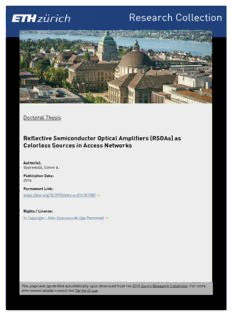
Reflective Semiconductor Optical Amplifiers (RSOAs) PDF
Preview Reflective Semiconductor Optical Amplifiers (RSOAs)
ETH Library Reflective Semiconductor Optical Amplifiers (RSOAs) as Colorless Sources in Access Networks Doctoral Thesis Author(s): Gebrewold, Simon A. Publication date: 2016 Permanent link: https://doi.org/10.3929/ethz-a-010781780 Rights / license: In Copyright - Non-Commercial Use Permitted Originally published in: ETH Zürich Series in Electromagnetic Fields 2 This page was generated automatically upon download from the ETH Zurich Research Collection. For more information, please consult the Terms of use. DISS.-No. ETH 23541 REFLECTIVE SEMICONDUCTOR OPTICAL AMPLIFIERS (RSOAS) AS COLORLESS SOURCES IN ACCESS NETWORKS A thesis submitted to attain the degree of Doctor of Sciences of ETH Zurich (Dr. sc. ETH Zurich) presented by SIMON AREGA GEBREWOLD M.Sc., Karlsruhe Institute of Technology born on 01.06.1987 citizen of Ethiopia accepted on the recommendation of Prof. Dr. Juerg Leuthold, examiner Prof. Dr. Mario Martinelli, co-examiner 2016 To my parents, your love, kindness and prayers are always with me. Be not wise in thine own eyes: fear the Lord, and depart from evil. King Solomon (Proverbs 3:7) Content Abstract .......................................................................................................... vii Zusammenfassung ........................................................................................... xi Challenge and Achievements of This Work ..................................................... xv 1 Introduction ........................................................................................... 1 1.1 Telecommunication Network ....................................................................................... 2 1.2 Optical Access Network ............................................................................................... 4 Fiber to the x (FTTx) .......................................................................................... 4 FTTx Technologies ............................................................................................. 6 Passive Optical Networks (PONs) ...................................................................... 7 PON Generations ............................................................................................ 11 State-of-the-Art: Colorless Upstream Transmitters for WDM-PON ................ 18 1.3 Summary .................................................................................................................... 24 2 Semiconductor Optical Amplifiers (SOAs) and Reflective-SOAs (RSOAs) ... ............................................................................................................. 27 2.1 Background of SOAs and RSOAs ................................................................................. 28 2.2 Application of SOAs and RSOAs in Optical Access Networks ...................................... 29 Boosters, Inline and Pre-amplifiers ................................................................. 29 Directly Modulated Transmitters .................................................................... 30 Suppression of Intensity Noise ........................................................................ 31 2.3 Operation Principle of SOAs and RSOAs ..................................................................... 31 Light Absorption and Emission in SOAs and RSOAs ......................................... 31 pn Junction Structures .................................................................................... 35 Lateral Confinement and Polarization Sensitivity ............................................ 40 Additional Design Challenges .......................................................................... 42 Materials ......................................................................................................... 43 Details on Material Gain and Light Propagation in SOAs and RSOAs ............... 44 3 Reflective Semiconductor Optical Amplifier Fiber Cavity Laser (RSOA-FCL) ............................................................................................................. 49 3.1 Reflective-SOA Fiber Cavity Laser as Directly Modulated WDM-PON Colorless Transmitter ........................................................................................................................... 50 Introduction .................................................................................................... 50 WDM-PON Architecture .................................................................................. 51 RSOA-Fiber Laser Modeling ............................................................................. 52 Simulation Results ........................................................................................... 56 Conclusion ....................................................................................................... 64 3.2 Alternative Amplified RSOA-FCL................................................................................. 65 Introduction .................................................................................................... 66 WDM-PON System Architectures .................................................................... 66 Simulation and Experimental Results .............................................................. 67 Conclusion ....................................................................................................... 69 iii Content 4 Comparison of RSOA-FCL with Alternative RSOA Based Colorless Transmitters .................................................................................................. 71 4.1 Introduction ............................................................................................................... 72 4.2 Mobile Fronthaul WDM-PON with RSOA-FCL as a Colorless Source .......................... 74 4.3 Operating Principle of the RSOA-FCL ......................................................................... 75 4.4 Theoretical Modelling of RSOA-FCL ........................................................................... 76 4.5 Characterization ......................................................................................................... 79 Experimental Setup ......................................................................................... 79 CW Results and Discussion .............................................................................. 80 4.6 Data Transmission Comparison .................................................................................. 83 4.7 Conclusion ................................................................................................................. 86 5 Bit- and Power-Loaded DMT for Maximum Bit Rate .............................. 87 5.1 Introduction ............................................................................................................... 88 5.2 DMT Signal Generation and Reception ...................................................................... 90 5.3 Experimental Setups .................................................................................................. 92 5.4 SNR Characterization ................................................................................................. 93 Electrical Bandwidth of the RSOA ................................................................... 94 RSOA-FCL Performance ................................................................................... 94 Performance Comparison of the Three Transmitter Schemes ........................ 98 5.5 Bit- and Power-Loaded DMT for Highest Bit Rates..................................................... 99 Maximizing the Capacity of the RSOA-FCL ...................................................... 99 Comparison of Maximizing Capacity ............................................................. 101 5.6 Conclusion ............................................................................................................... 102 6 Summary and Outlook ........................................................................ 103 6.1 Summary .................................................................................................................. 103 6.2 Outlook .................................................................................................................... 104 Appendix A: Improved Euler’s Method .................................................... 107 Appendix B: Additional RSOA Simulation ................................................. 109 B.1. Static Modelling ........................................................................................................... 109 B.1.1. Spatial Distribution of Carrier Density, ASE and Signal Powers ........................... 109 B.1.2. Gain Saturation ................................................................................................... 111 B.2. Dynamic Modelling ...................................................................................................... 114 B.2.1. Small Signal Modulation Response ...................................................................... 114 B.2.2. Direct Modulation and Modulation Cancellation ................................................ 116 Appendix C: DMT Signal Processing ......................................................... 119 C.1. Bit- and Power-Loading: Chow’s Algorithm ................................................................. 120 C.1.1. Transmitter SNR Characterization ....................................................................... 120 C.1.2. Bit-Loading .......................................................................................................... 121 C.1.3. Power-Loading .................................................................................................... 124 C.2. Real-Valued DMT Signal Generation ............................................................................ 125 C.3. DMT Receiver DSP ....................................................................................................... 126 C.3.1. DMT Timing Synchronization............................................................................... 126 C.3.2. Frequency Synchronization ................................................................................. 127 Appendix D: Polarization Retracing in FCLs .............................................. 129 iv Content Glossary ....................................................................................................... 133 Greek Symbols .................................................................................................................... 133 Latin Symbols ...................................................................................................................... 134 Acronyms .................................................................................................... 139 References ................................................................................................... 143 Acknowledgement ....................................................................................... 161 List of Publications ....................................................................................... 163 Journal Papers .................................................................................................................... 163 Conference Contributions................................................................................................... 164 Curriculum Vitae .......................................................................................... 167 v
Description: